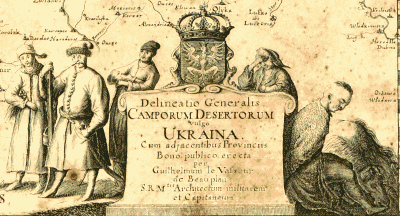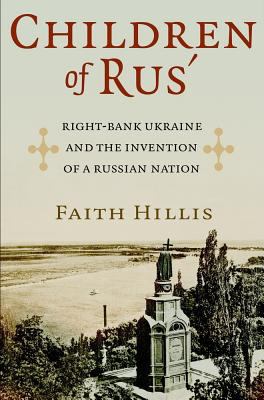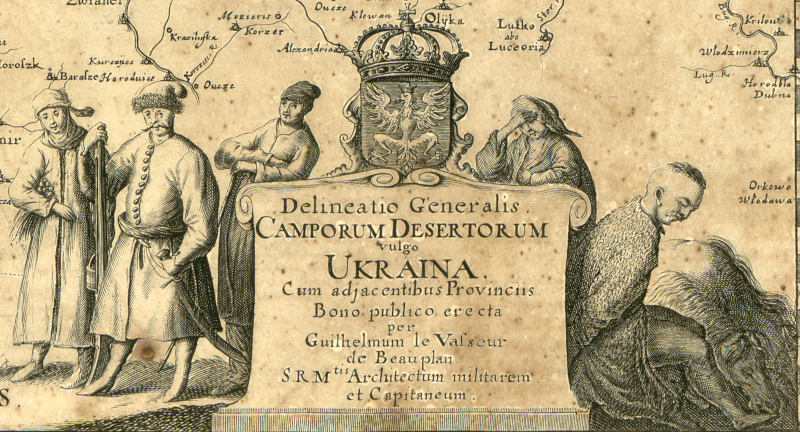Where the name of Ukraine come from?


| Origin of the word Ukraine | |
|---|---|
| Perhaps some of the most far-fetched explanations on the Internet are “Where did the word Ukraine come from” and “Origin of the word Ukraine”. To find our answer to this question, we will start with the indisputable, scientifically proven, evidence of the first mention of this name, which indicates its use exclusively for the lands mentioned. This is the map of Ukraine of 1648, William de Beauplan [9]. | |
 |
Like the maps of those years, this map has inscriptions in Latin. It has the title: ”General plan of the steppe plain, commonly known as Ukraine: with adjacent provinces” (Delineatio generalis Camporum Desertorum vulgo Ukraina: cum adjacentibus provinciis). The special value of this testimony lies in the fact that the name ”Ukraina” is not yet official, but is only included in official documents, judging by the form of presentation: ”widely known as”. This map is oriented north to the bottom, but this does not prevent us from determining that it depicts the territory of modern Ukraine. |
|
The given map was commissioned by Poland, for the lands that came under its
authority, which had previously become part of the Polish-Lithuanian Commonwealth
in 1569 [1]~[2]. Therefore, the history of the name should be sought in the
Polish language. The word ”Ukraina” in Polish can be composed of the prefix and the root U+kraina or a merger with a preposition. In the first case, this prefix can turn a noun into a verb, or change the form of a verb or an adjective. Examples of the use of the prefix ”u” in Polish: The Slavic toponym ”kraina” (country - feminine) can mean a country or a region (region). The more common masculine form ”kraj” can have more meanings: locality, region, country, neighborhood (outskirts), province. The meaning of suburb or province does not explain the name Ukraine, since the title of the map of 1648 indicates Ukraine with its already adjacent suburbs: ”cum adjacentibus provinciis”. So, the name formed as an adjective can refer to the words ”country” or ”region” in the following two ways: 1) With the help of the prefix ”u”, the word ”kraina” (country) acquires the meaning ”nationalize” (give state status). The event that preceded the creation of the indicated map and is directly related to the meaning of this word is the decree on the registration of Ukrainian Cossacks on these lands. Registered Cossacks swore an oath to the Polish king and became state (”national”) soldiers [11]. 2) In the case of merging the preposition with the noun U+kraina, this preposition has the meaning ”in”. Turning to the dictionaries of ancient words of the Polish language in names and surnames [3]~ [4], one can come across the use of the words ”krajowi” and the combination ”u krajowi” as the adjective ”local”. The interpretation of this usage is also found in modern dictionaries:   The historical basis of this way of the emergence of the name of the annexed territories is their legal status, which distinguished them from the Polish population [11]. This legal situation was local and limited the rights of the inhabitants of these lands. When merging a preposition with an adjective, such a combination is interpreted as ”Ukrainian” (probably a language):  Historically, the use of the term ”krajowi” could mean both regional and state. In ancient times, the administrative division of Poland consisted of voivodeships. The voivodship had its own regional army and a commander (voivode), who were subordinate to the king. The magnates had their own military security forces, which were not state-owned. Therefore, the word ”krajowi” could be used in both meanings, state or regional that are subordinate to the state. A modern example of such dual use takes place in the United States. When Americans say ”state university” it can mean: it is a good idea to study the Polish archives of correspondence and orders of those times in order to find out which of the two specified ways of forming the word Ukraine is more likely. It will make an ability to discover the way how it was used in sentences. | |
| Other names | |
|---|---|
|
There are other titles where people search for ”Where does the word Ukraine come
from?”. First of all, this is the word Little Russia and Great Russia. These
names were invented by the Romanov dynasty, as a rewriting of history and a
replacement of the concepts of Little Rus and Great Rus, which arose in the
13th century. October 20, 1335 is considered the date of official approval of the name Little Rus’ when the Prince of Halytskyi and Volhynia Yurii the Second Boleslav in a letter to the Grand Master of the German Order of Dietrich, called himself ”duxtotius Russi; Minoris” (prince of all Little Rus’) [5]. The essence of such a name was the division of dioceses. The Galician metropolis, created in 1303, consisted of six dioceses: Galicia, Przemyśl, Volodymyr-Volyn, Kholm, Lutsk, and Turiv (territory of modern Belarus). All these lands were part of the Galicia-Volyn Principality. Thus, two metropolitans appeared in Rus’, and Rus’, by the will of the Byzantine patriarch, was formally divided into Little and Great. Little - 6 dioceses and Great - 19 dioceses. Dioceses under the authority of the Metropolitan of Kyiv were called Great Rus’ [5]. Later, the Metropolitan of Kyiv moved from the decaying Kyiv to the prosperous Volodymyr. In 1325, the Kyiv patriarch moved to Moscow, which was rapidly developing due to levies [10], while Kyiv remained only formally the spiritual capital. This can be seen from the title given to the metropolitan who was already sitting in Moscow: “Metropolitan of Kiev, Little and All Russia“, where “Little“ referred to the Principality of Galicia-Volyn. All other uses of this name have no historical basis and are refuted by modern genetic studies of ethnic groups. The border of Little Rus’ (Galicia-Volyn diocese) and Great Rus’ (Kyiv diocese) does not indicate ethnic changes. As we can see, the words Little Russia and Great Russia invented by imperial propaganda have so distorted their original meaning that their use introduces confusion. |
| Other interpretations of “Where the name of Ukraine come from?“ | |
|---|---|
| The most sweet version of the appearance of the name Ukraine
to a Moscow ear is the word “outskirts“. The civilized world has been
“treated“ to this interpretation for so long that it needs rehabilitation,
which is applied after a totalitarian religious sect. Not the last is the impact
of neuro-linguistic zombification by the consonance of “Ukraine-okraine“
(it's how sounds couple “Ukraine-outskirts“ in the most slavic languages).
The falsity of this version is such that it does not need any additional sources to refute it. In the previous chapter, there was an appeal to the history of the Galicia-Volyn principality, which included the city of Peremishl (Polish Przemyśl) [5]. Now it is the territory of Poland, and the city is called Przemyśl. The empire gave these lands to Poland. The distance from Kyiv to Przemyśl is the territory of two medium-sized European states. At the same time, those remote regions are not called the outskirts, but insistently sculpt this name to central Ukraine. Maybe supporters of this version rely on other historical periods? If the use of the name Ukraine became the most widespread during the Romanov dynasty, then it is worth considering the geography of this period. Poland is part of the Russian Empire. The western edge of the empire lies far beyond the Vistula River [7]. It is such a distance from Kyiv that this version becomes nonsense. Unlike the version of the “consonants“ (outskirts), modern versions from religious chronicles are more interesting because they have a historical document as the subject of discussion. The word like “Ukraine“ was found in the Peresopnytsia Gospel of 1556. Before that, manuscripts of those ages were also found with words wich sounds similar to the word Ukraine. They have three common faults in ignoring the following: |
| An unacceptable explanation of the name of Ukraine Сonclusion | |
|---|---|
|
Despite the ease with which the versions of the origin of the word Ukraine
refuted here are destroyed, the proposed version is unacceptable. What is wrong
with it? It destroys the widespread stereotype that Moscow is Great Russia
(Great Rus’), and Ukraine is a small annex with settlers (Ukrs) on the outskirts
of the empire. If the word Ukraine is just another name for Great Rus’
introduced by the Poles, then those who today call themselves exclusively
“Russians“ and “Great Russians“ use someone else's name.
(word Russia origins from the word Rus’)
This statement may seem too radical, because in today’s information war, quantity wins, not quality. Let’s look for qualitative support for this opinion. It should be an independent party, not Ukraine or Russia, and a scientific approach (scientifically peer-reviewed works) based on independent historical sources. There are such works, but they are books (scientists are old-fashioned), not popular websites. | |
 |
One of them is the scientific work of Faith Hillis “Children of Rus’:
Right-Bank Ukraine and the Invention of the Russian Nation“
(2013 ISBN: 9780801469268). This book is indicated first for students of
English-speaking universities [6]. What seems unacceptable to the zombified Slavic
world has long been researched, proven and explained in a form accessible for
a textbook.
So, let's consider here the origin of the word Ukraine, which is not unique in its radicalism and has the right to an impartial review. Unlike the others, this version is not only provided with an expanded logic of word formation, but also three ways of confirmation: |
 | |

Citations and references
| [1] | Source: | Ukraine - Lithuanian and Polish rule. Britannica (English) |
|---|---|---|
| [2] | Source: | The War in Ukraine - Ukraine before the First World War. University of Connecticut 1921 (English). |
| * | Mirror: | Ukraine came under Polish-Lithuanian Commonwealth control. University of Connecticut 1921 (English). |
| [3] | Source: | Polski słownik objaśniający. Polish explanatory dictionary (Polish) |
| [4] | Source: | Odkryć pochodzenie nazwisk. Discover the origin of surnames (Old words, Polish) |
| [5] | Source: | Origin of the concept of Little Russia. |
| * | Mirror: | Origin of names Little and Great Rus’ (Russia) Dmitry Sharko, 2019 (Russian). |
| [6] | Source: | Children of Rus’: Right-Bank Ukraine and the Invention of a Russian Nation by Faith Hillis 2013. ISBN: 9780801469268 |
| [7] | Source: | Ethnographic map of the Russian Empire according to Ritikh and Venyukov St. Petersburg: Ilyin, 1862 |
| * | Mirror: | Ethnographic map of the Russian Empire according to Ritikh and Venyukov, St. Petersburg: Ilyin, 1862 |
| [8] | Source: | The word and name Ukraine: from the Kyiv Chronicle to Bohdan Khmelnytskyi Danylo Statsenko, Historical Truth 2021 (Ukrainian) |
| * | Mirror: | The word and name Ukraine: from the Kyiv Chronicle to Bohdan Khmelnytskyi Danylo Statsenko, Historical Truth 2021 (Ukrainian) |
| [9] | Source: | A general outline of the prairie plains commonly known as Ukraina: with the adjacent provinces by William de Beauplan 1648 (oriented with north to the bottom), US Library of Congress. |
| * | Mirror: | A general outline of the prairie plains commonly known as Ukraina: with the adjacent provinces by William de Beauplan 1648 (oriented with north to the bottom), US Library of Congress. |
| [10] | Source: | How the Moscow princes made money by collecting tribute for the Golden Horde (Russian) Alexander Kostyukhin “Forum Bell” 2017, Russia |
| * | Mirror: | How the Moscow princes made money by collecting tribute for the Golden Horde (English, translated from Russian) Alexander Kostyukhin “Forum Bell” 2017, Russia |
| [11] | Source: | Formation of the registered Cossacks and its legal status (Ukrainian) |
| * | Mirror: | Formation of the Ukrainian registered Cossacks and its legal status |
*Mirror: The mirror archive contains the same document as a source had at the publication time with a copyright attribues. Some documents may disappear from the Internet public access during the information war. It is why the most important documents are copied to the mirror archive. | ||